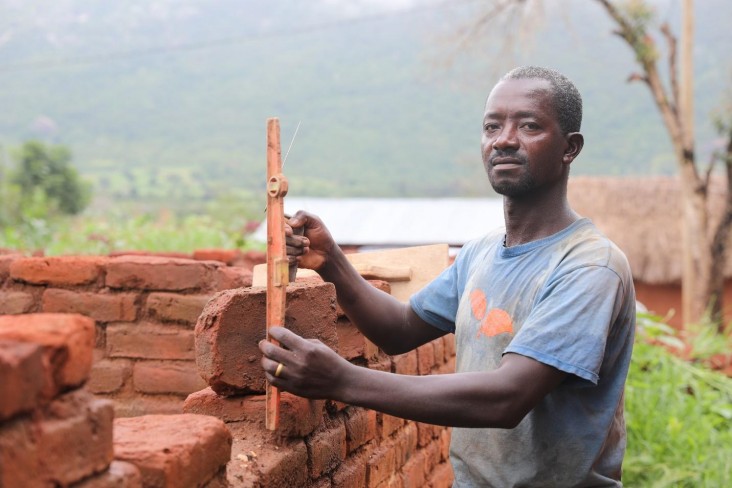Speeches Shim

Forty-nine-year-old Babeli is a mason in his village. He is also a peer educator for those who, like him, are living with HIV. His calling to become a peer educator was borne from a deep sense of empathy toward others.
“I didn’t have anyone supporting me when I learned of my status. I don’t want others to go through this alone,” Babeli shares.
His first wife, with whom he had two girls, died in 2008 after hiding her HIV status. It was only following her death and a long bout of illness that Babeli learned of his own status, some three years later. Before this, he had sought the help of traditional healers to no avail.
“Initially, I was diagnosed with tuberculosis (TB). A few months later, I came to learn I was HIV positive. I was in total shock,” he reveals.
As a peer educator, Babeli takes great pride in his testimony and uses it in most of his sessions in his village. He’s employed by the Ilula Orphan Program, a local NGO supported by the USAID Boresha Afya Southern Zone activity. The aim is to encourage people living with HIV (PLHIV) to stay on antiretroviral therapy, which can reduce the virus in a patient’s body to undetectable levels, keeping them healthy and significantly reducing the likelihood they can infect others with the virus.
Peer educators like Babeli follow up with clients with HIV who are defaulting from care and treatment, track missed appointments, form Community Adherence Groups, and combat stigma through health education.
By working closely with PLHIV as peer educators, USAID has been making positive strides in ensuring 90 percent of all people receiving antiretroviral therapy will achieve viral suppression.
Babeli knows how important antiretroviral therapy is. He began taking his medication immediately, and the transformation has been noteworthy.
“I was bedridden for a lengthy period, but I’m now strong,” he flexes his biceps.
He smiles, and he has a reason to. Today, his viral load is undetectable. He is now married to Magdalena, who is also living with HIV. Her viral load is also undetectable. Together, they have a healthy HIV-negative boy, four-year-old Ibrahim.
On the wall in his living room is a care and treatment center schedule of the Lyasa Image Dispensary where he conducts sessions. He visits the dispensary nine times a month to support and encourage his peers. At present, he is in the process of forming an economic strengthening group for PLHIV. The purpose is to empower them.
“HIV isn’t the end of our lives. It’s just a different beginning,” he says.
Babeli also doubles as a TB community health worker and uses his experience to educate his community on the symptoms of the disease and its treatment. To date, he has referred 45 clients for TB screening.
Babeli’s most endearing trait is his mental strength. He has not succumbed to stigma, although he admits he was the target of many jokes and snide remarks early in his battle with HIV. He has always shown remarkable resilience and fortitude. His distinct passion for his work has led him to form a group of 10 peers and successfully return 65 lost-to-follow-up clients to care. Over a four-month period, Babeli and other peer educators, supported by the USAID Boresha Afya Southern Zone activity, contributed to returning over 30,000 clients into care.
“I wouldn’t be a peer educator if I let stigma sidetrack me. My testimony is what empowers my peers,” Babeli expounds.

Comment
Make a general inquiry or suggest an improvement.